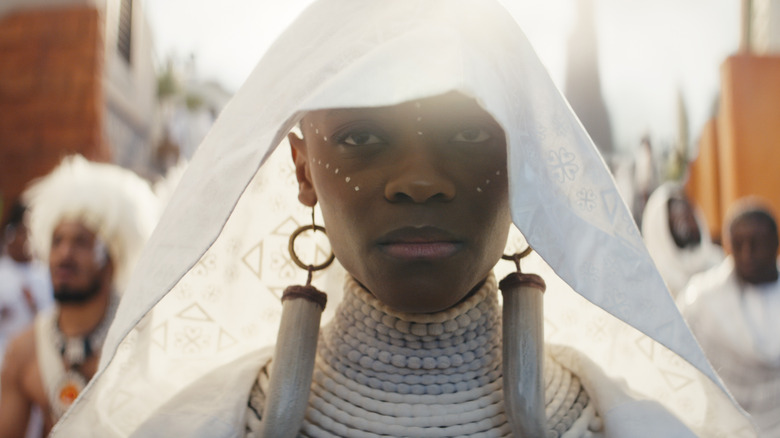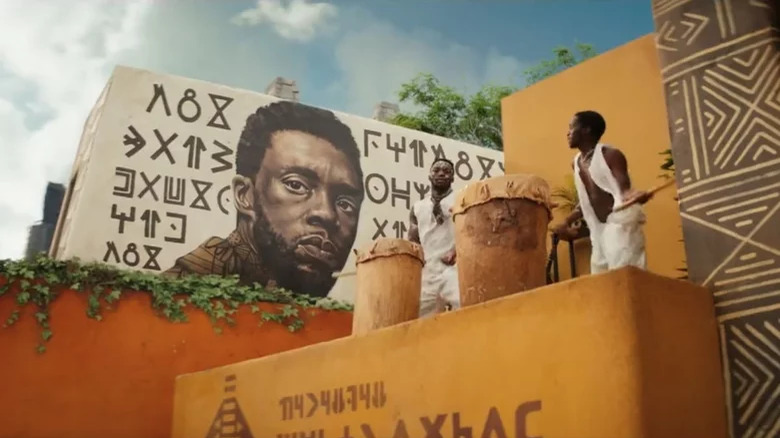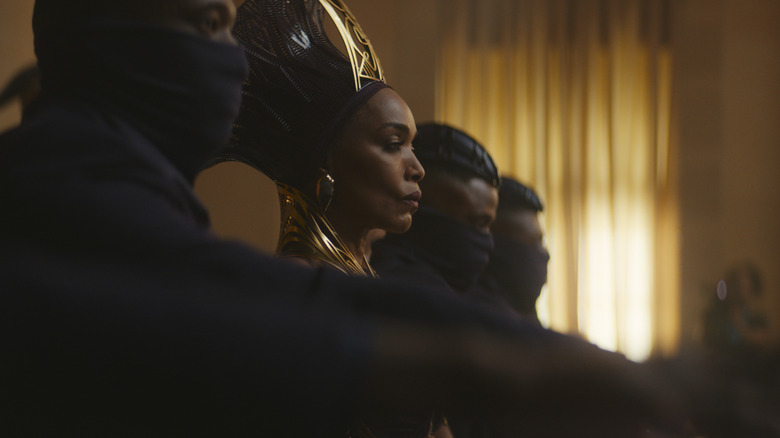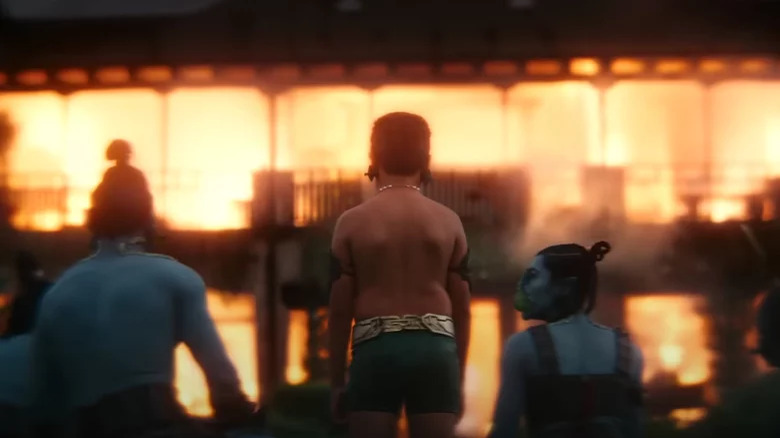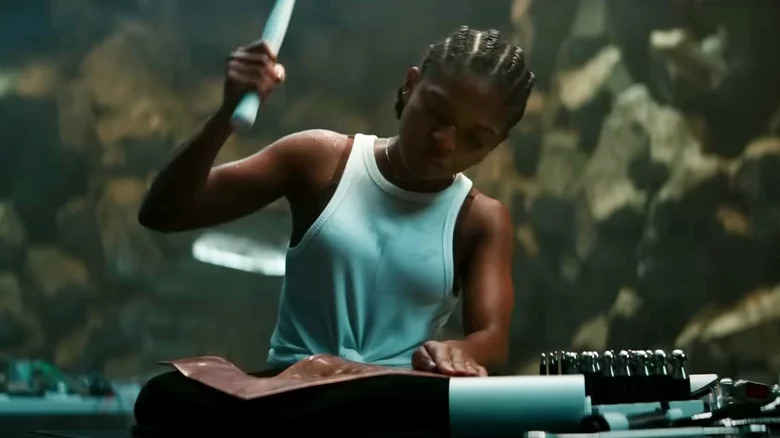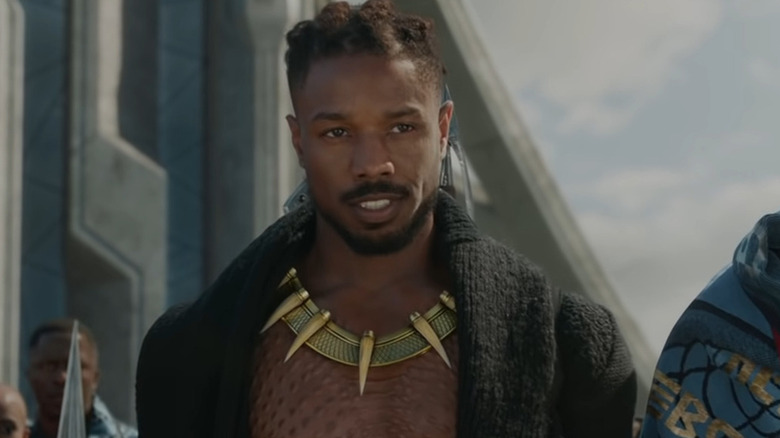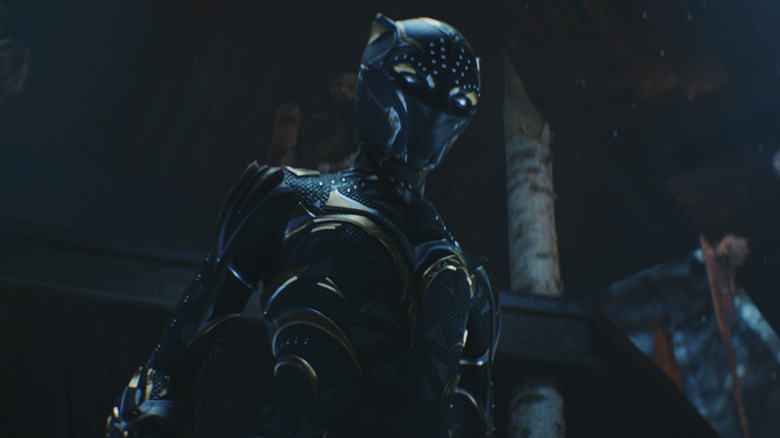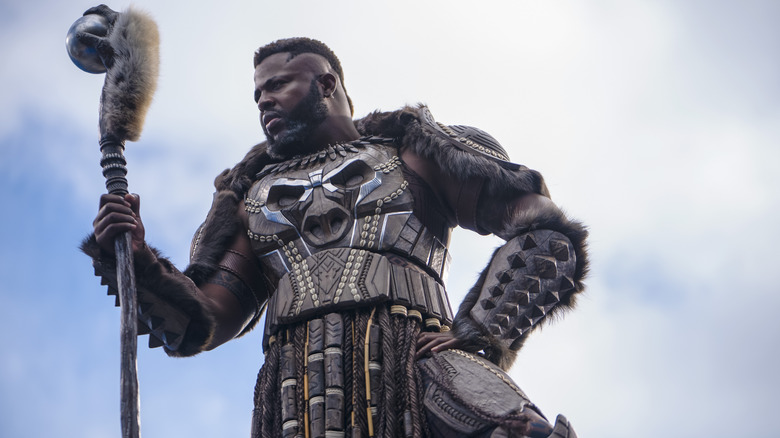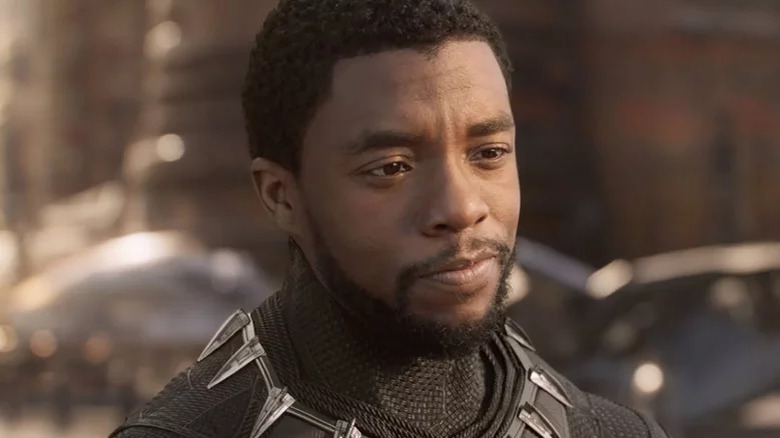The Most Important Moments In Black Panther: Wakanda Forever
Spoilers for "Black Panther: Wakanda Forever" follow.
Even four years later, "Black Panther" remains one of the best and most unique films in the Marvel Cinematic Universe. Not only was it a giant blockbuster and the last build-up before "Avengers: Infinity War," it was a cultural moment, too. After all, how many other superhero movies have a mantra that has survived and morphed into being just part of the cultural zeitgeist like "Wakanda Forever"?
With a film that big, anticipations for a follow-up were unsurprisingly sky-high. While the version of "Black Panther: Wakanda Forever" we got isn't too far off from Ryan Coogler's original vision, it still was deeply affected by the passing of Chadwick Boseman. After many trials and tribulations, including scandals and a global pandemic, the film is finally here, and it managed to surpass all expectations.
"Wakanda Forever" is not the film we expected, but it is a deeply emotional, loving tribute to Boseman, a poignant exploration of grief and the struggle between tradition and innovation, all while delivering a thrilling superhero movie sequel that also introduces a whole new realm and two brand new characters — and also a global conflict with potentially devastating consequences for the entire MCU going forward.
This is a big movie, and a lot of big things happen in it. Whether you missed any of it, or simply want to reminisce about how cool and emotional it was, we're here for you. These are the biggest moments in "Black Panther: Wakanda Forever."
A funeral fit for a king
From the moment the film was announced to go forward after the death of Chadwick Boseman, the big question was how they'd handle the character of T'Challa, whether he would be retired or recast. The answer is a loving tribute that will likely not leave a dry eye in the theater, as "Wakanda Forever" starts with the death of King T'Challa from an undisclosed illness he kept hidden from the world (much like Boseman did) and a beautiful funeral that takes place across all of Wakanda. We've seen the MCU grieve its heroes before, but this is the first time that we truly feel the effects of a hero's death on the world.
There is great grief that is not just felt by Wakanda, but also by T'Challa's loved ones. There's Shuri, who tried and failed to cure her brother by replicating the Heart-Shaped Herb that gave him the powers of the Black Panther. And there's Queen Ramonda, who saw both her husband and her firstborn die, and is grieving them deeply. The death of T'Challa is not just the emotional backbone of the entire movie, but it has big repercussions both for the story and the larger MCU, as the loss of Wakanda's protector leads to international conflict.
The world does as the world does
Even before the death of T'Challa, the fact that Wakanda opened up to the world brought as many curses as it did blessings. Here, Ryan Coogler acknowledges that a nation with the most powerful metal in the world, with the most powerful weapons, but also located in Africa, would undoubtedly be the target of foreign nations trying to steal vibranium.
We learn this when Queen Ramona gives a powerful, poignant speech at the United Nations after she is accused by the U.S. and France of not sharing her resources with the rest of the world. She instead reveals multiple attacks on Wakandan outreach centers to try and steal their weapons. This may be the most biting piece of political commentary in a Marvel movie since the first "Iron Man," as the film touches on a very real history of war driven by a desire for other countries resources. This pays off the story arc of the previous movie and the struggle between interventionism and isolationism, showing the consequences of T'Challa's actions, all while setting up a major international conflict where Wakanda is being villainized by powerful countries in an attempt of stripping them of vibranium.
Niño sin amor
One of the most anticipated aspects of the film was the introduction of Namor the Sub-Mariner, one of the oldest Marvel characters, into the MCU. Wakanda and Atlantis have a long history in the comics, and the film pays that off beautifully, but not before drastically reinventing the sunken kingdom and its mutant king. Rather than just Namor, he is called K'uk'ulkan, based on the Feathered Serpent deity of the Yucatec Maya people.
In a standout scene in the film, we get to see the origin story of Namor and his people. Rather than some "Ancient Aliens"-like myth of underwater people who predated real Mesoamerican civilizations and gave them the tools to prosper, the Talokanil people are portrayed as very real Yucatec Mayans who escaped the Spanish conquest with the help of their own vibranium-infused herb that gave them the ability to breathe underwater.
The flashback culminates in a scene where a young Namor travels to the surface to bury his mother, and instead finds her homeland in ruins and her people in chains. After being attacked by the Spanish, a priest curses Namor and his winged feet, saying he's a spawn of the devil and a "niño sin amor," or child without love in Spanish. It is that insult that K'uk'ulkan took as a name for his enemies: Namor, intrinsically connecting the character to the real history of genocide in what became Latin America.
A heart of iron
As if introducing Namor wasn't enough, "Wakanda Forever" also continues the MCU's trend of passing the torch of original Avengers to the next generation. The member of the next generation here is Riri Williams, aka Ironheart. A character that could have easily felt like overstuffing the film, Riri instead fits the world of Wakanda like a glove. She bonds with Shuri, as two young scientists in a world that overlooks them, she fits as a mighty and very technologically advanced fighter in a nation full of advanced technology and formidable warriors.
And, in one of the biggest moments of the film, we see Riri suit up for the first time, in her own makeshift Iron Man costume, and flying off while fighting the cops and even a drone. It's a thrilling moment that brings back the origin of the MCU itself, which started with just a man in a cave alone with his grit and intellect. Riri fully embodies that, with "Wakanda Forever" showing her to be as smart as Tony, Peter Parker, or Shuri, except more resourceful since she is using scraps and whatever she can find. It also does a great job in setting up the upcoming "Ironheart" TV show by presenting a hero that feels familiar in her humor, but unique and different in how aware she is of the dangers her suit carries.
The return of the king
This may have been the biggest surprise of "Wakanda Forever." The return of Killmonger had been theorized for years, even as a possible contender for the next Black Panther despite the fact that he is — you know — dead. Killmonger remains one of the best villains in the MCU, but his time with us was unfortunately rather short.
And yet, that didn't stop Ryan Coogler from bringing Erik Killmonger back in "Wakanda Forever" at a critical moment. You see, when Shuri finally recreates the Heart-Shaped Herb and gains the powers of the Black Panther, she travels to the Ancestral Plane. Rather than find her brother or mother there, however, she finds her cousin, N'Jadaka, aka Killmonger. It is a powerful moment heightened by Michael B. Jordan's incredible charisma and authority, but it also pays off his story arc in the first film by having Shuri outright confront him for his cowardly destruction of the herb, which directly led to the death of T'Challa.
Watching Michael B Jordan and Letitia Wright riff off each other is already thrilling, but the scene is also pivotal for Shuri's story in the film. "Wakanda Forever" is all about grief, and the anger that comes with it. Shuri spends most of the film wanting to burn down the world, and it is her meeting with Killmonger that both fuels that raging fire and leads her to realize how destructive that path is.
A new Black Panther
There was no other choice, was there? The moment a new Black Panther was teased, it simply had to be Shuri. Not just because that's what happens in the comics, but because it made the most sense for her character, always at the forefront of Wakandan innovation and particularly in the creation of new suits. That being said, she had to earn her powers, and boy does she.
All throughout "Wakanda Forever," we see Shuri struggle. She struggles to have her voice heard when all the elders seem firmly determined to keep their old ways in a rapidly changing world. She struggles with the grief she feels over not being able to cure her brother. She struggles with not sympathizing too much with Namor, who wants to destroy the surface before they bring harm to his family. She also struggles to keep Namor at bay when he decides to attack Wakanda.
But the moment Shuri finally makes puts the suit on is a moment of triumph and it makes an emotional climax for the movie. It is also a moment that states that "Black Panther" does not end with Chadwick Boseman. This movie is bigger than him, just like the Black Panther is bigger than T'Challa. This is the ending of one chapter and the beginning of a new one.
King M'Baku?
If "Wakanda Forever" is all about the country, and the franchise, moving forward after an unspeakable tragedy and embracing the future, then one of the most important moments is when Shuri chooses not to attend her coronation, but M'Baku shows up instead. We do not see the outcome, but it is fair to assume M'Baku could end up as the King of Wakanda (assuming Shuri doesn't want to be queen and rule things all by herself).
This would be a most fitting conclusion to one of the most satisfying arcs of the whole MCU. We've seen M'Baku grow from an angry, detached warrior who doesn't really care for the rest of the nation, one who scoffs at any notion of unity or fellowship, but who has a heart of gold and is willing to help T'Challa in his hour of need. Throughout "Wakanda Forever," we see M'Baku rise to the occasion, serving as an advisor to Shuri, as a protector of Wakanda offering refuge in the Jabari mountains, and fighting against the Talokanil. He's become a more observant character, and a caring leader, so seeing him finally win the throne would be extremely satisfying.
One last goodbye
Of course, this list could not end without mentioning the biggest surprise of "Wakanda Forever." In the only credits scene, we discover the reason Nakia didn't show up to T'Challa's funeral, as well as the reason she was not in Wakanda during The Blip. Turns out, she and T'Challa had a son, named Toussaint. Except, that's his Haitian name. His Wakandan name? T'Challa. Now, this has a comics precedent in Azari T'Challa, a character introduced in 2010 as the son of the Black Panther and Storm, and later a member of the Next Avengers, a group consisting of the sons and daughters of the original avengers.
Having a new T'Challa is not only exciting for the future of the MCU way down the line, but it is a beautiful tribute to the original T'Challa, proof that life goes on, and that no one's ever really gone.
